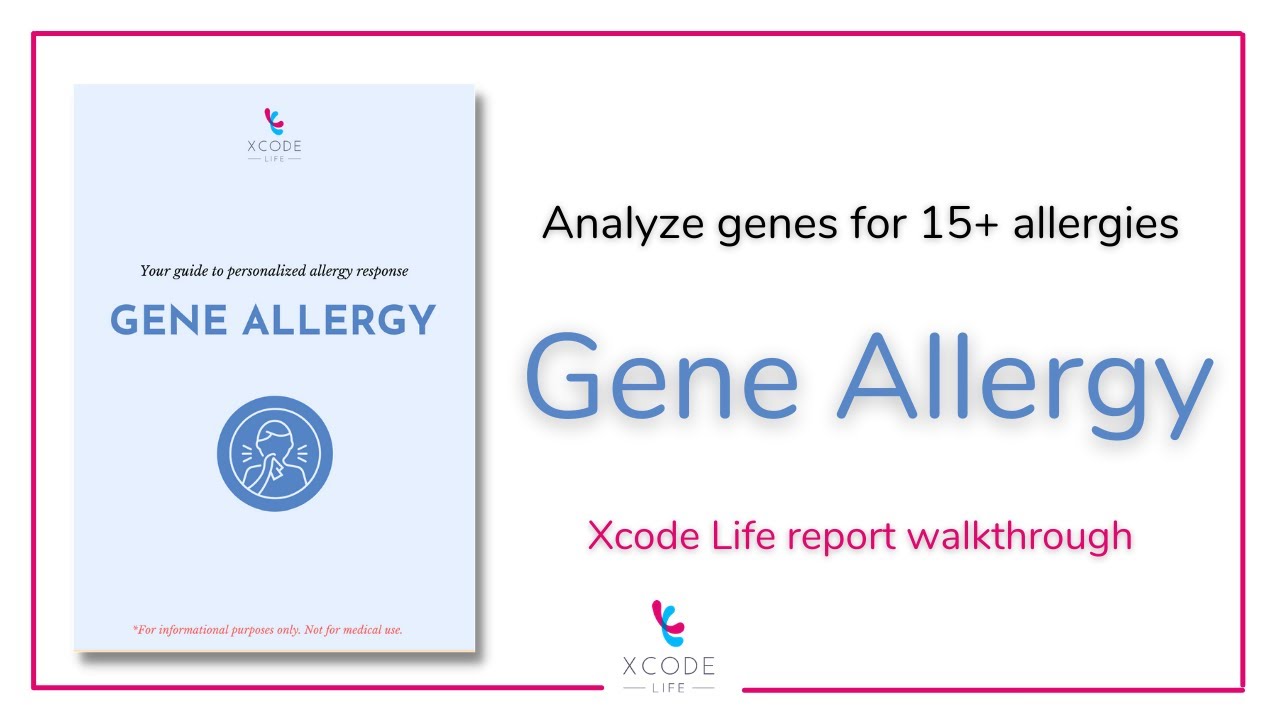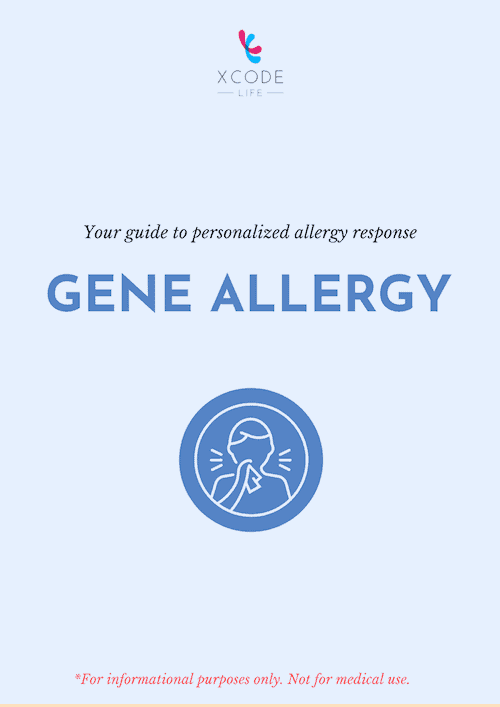Red meat is one of the staple food sources in the United States. According to the Centers for Disease Control and Prevention (CDC), more Americans are getting allergic to red meat thanks to a particular species of tick bite. As many as 450,000 Americans could be affected by this syndrome. The lone star is a species of tick native to parts of the USA and Mexico. Being bitten by this tick may surprisingly make a person allergic to red and processed meat! Keep reading to learn more about this tick-induced red meat allergy and the possible treatments.
Did You Know? Your ancestry test DNA data includes 700,000 markers, which can be used to learn your risk for various seasonal, environmental, food, and drug allergies. Learn more.
Alpha-gal Syndrome Or Tick-induced Red Meat Allergy: An Overview
Alpha-gal is a sugar molecule present in most mammals.
It is found in red meat (beef, venison, pork, lamb) and animal products like dairy, gelatin, and food cooked in animal fat.
This sugar molecule isn’t found in poultry or seafood.
The alpha-gal syndrome (AGS) is a life-threatening allergic reaction to red meat or other food products containing the alpha-gal molecule.
The lone star is a species of tick found prominently in the Southeastern and Eastern United States and parts of Mexico.
This species is also called the Northeastern water tick or the turkey tick.
The tick is identified by the single star-shaped mark on its back.
Lone star tick bites may cause various conditions, including the following:
- Ehrlichiosis
- Heartland virus disease
- Southern tick-associated rash illness (STARI)
- Bourbon virus disease
- Tularemia
CDC confirms that the tick bite may also lead to AGS.
Symptoms Of Alpha-gal Syndrome
In people with AGS, the IgE antibodies get triggered by the red meat's alpha-gal molecules and start reacting.
The body experiences anaphylaxis-like allergy symptoms, which can become life-threatening unless treated quickly.
Unusual Symptoms
Some of the symptoms of AGS are:
- Hives
- Rashes
- Angioedema (swelling of the deep layers of the skin)
- Abdominal pain
- Diarrhea
- Nausea and vomiting
- Shortness of breath
- Swelling of lips, tongue, and throat
Also Read
Genetics Of Food Intolerance and Food Allergy
Causes And Risk Factors
The lone star tick is found in dense woodlands and, according to experts, are aggressive biters.
They can crawl quickly into the furs of pet animals, cattle, or deer.
These lone star ticks move fast and can also crawl from the foot level onto human skin.
The two most significant risk factors for lone star tick bite are living around woodlands or exposure to woods and having pets/cattle herds that get infected with lone star ticks.
Apart from these, the following factors may also affect the risks of developing AGS.
- Age
- Alcohol consumption
- Existing endoparasite infections
How Can Tick Bites Cause Red Meat Allergy?
When ticks bite humans, alpha-gal molecules in their saliva get transferred to the bloodstream.
The body considers the alpha-gal molecules dangerous, and the immune system kicks into action.
The lymphocyte cells release anti-alpha-gal IgE cells in response.
Now, the person develops an antibody response to the alpha-gal molecules.
Red meat like beef, venison, lamb, and pork contains alpha-gal.
Some cuts of meat, especially the organs, contain very high levels of alpha-gal.
When a person whose body has alpha-gal antibodies consume red meat, there may be an allergic reaction triggered.
Allergy and Drug Sensitivities
Understand the root cause of your allergies with a DNA-based report. Identify genetic risk factors & get personalized recommendations for relief and management.
Complications of Red Meat Allergy
One complication with red meat allergy is the low awareness about AGS in the United States.
CDC surveyed 1500 medical practitioners nationwide, and over 50% hadn’t heard of AGS.
Of those aware of the problem, one-third weren’t confident in treating patients.
Red meat allergy could become a public health problem, with lifetime effects in a few patients.
More than 90% of Americans consume meat.
The overall consumption of red and processed meat in the United States is about 73.6%.
Does Alpha-gal Allergy Go Away?
In some people, antibodies may reduce over time, and they can start including red meat like before.
In others, this could be a long-long condition, preventing them from consuming red meat.
Acquired vs. Inherited Red Meat Allergy
Acquired red meat allergy develops after a lone star tick bite.
It is scarce for someone to inherit red meat allergy. However, it isn’t entirely impossible.
According to studies, people with the B or AB blood type were five times less likely to develop AGS.
The alpha-gal molecules and the B antigen both have similar structures. As a result, the immune system may ignore the molecules and not trigger a reaction.
Diagnosis And Treatment Of Red Meat Allergy (Tick)
A simple blood work will help check the amount of alpha-gal antibodies in the body.
This is a clear indicator of red meat allergy.
In some cases, your doctor may request a skin test.
A small portion of the skin is pricked and exposed to substances extracted from red meat.
The lab technician then checks for allergic reactions.
In most cases, allergy medications are prescribed to handle rashes, hives, and swelling.
Doctors may offer a shot of epinephrine in more severe cases to handle the allergic breakouts.
If you experience any signs of an allergic reaction, please visit your nearest Emergency Care immediately.
Food Allergy Genetic Test
The Allergy and Drug Sensitivity panel of Xcode Life includes 45 important allergy aspects, including vital information on 6 food allergies. If you have done an ancestry genetic test with companies like 23andMe, AncestryDNA, MyHeritage, etc., you can learn your allergy status in just 3 steps.
No DNA Test? No Problem
Not yet tested?
If you're new to the world of genetic testing, we've got you covered! You can now get your ancestry DNA kits at an additional discount!
Purchase a DNA kit at 10% OFF (the discount will be reflected when you add the product).
- 23andMe Ancestry Kit
- 23andMe Health + Ancestry Kit
- AncestryDNA Kit (currently no additional discount available)
After you receive your DNA test results from the kit, you can upload your DNA data to our secure platform.
Is Avoiding Red Meat The Only Way To Prevent Red Meat Allergy (Tick)?
For people who have recovered from red meat allergy, staying away from red and processed meat for a couple of years is essential.
It helps prevent future allergic triggers.
Other food products in the market may also contain traces of alpha-gal.
Please talk to your doctor and get a list of food sources to avoid.
These individuals can get their blood work done after 1-2 years to check the level of alpha-gal antibodies in the blood.
People who get a clear report may gradually start including smaller portions of red meat.
Summary
- Alpha-gal syndrome (AGS) is a condition that triggers an allergic response in people after consuming red meat.
- Alpha-gal is a molecule found in red meat and other animal products.
- The lone star is a species of tick found in the Southeastern and Eastern United States. These ticks can bite human beings.
- The tick's saliva contains the alpha-gal molecule and is transferred to humans when they get bitten.
- As a result, the body produces alpha-gal antibodies to prevent the risk of infections. These antibodies remain in the body for a long time.
- When these individuals eat red or processed meat, alpha-gal molecules from the meat enter the body. The body now has a more robust immune response towards it and hence triggers an allergic reaction.
- AGS can cause shortness of breath, swollen lips and throat, nausea and vomiting, gastric problems, and diarrhea.
- In some individuals, the number of antibodies reduces over time, and they can start consuming red and processed meat after a while. In others, this could be a lifetime problem, and they must avoid red meat.
- Other food products like gelatin and dairy may also contain alpha-gal molecules. It is essential to identify these food sources and stay away from them too.
References
https://www.cdc.gov/ticks/alpha-gal/index.html
https://www.cdc.gov/media/releases/2023/p0727-emerging-tick-bites.html
https://parasitesandvectors.biomedcentral.com/articles/10.1186/s13071-019-3413-z
https://www.cdc.gov/ticks/alpha-gal/products.html







